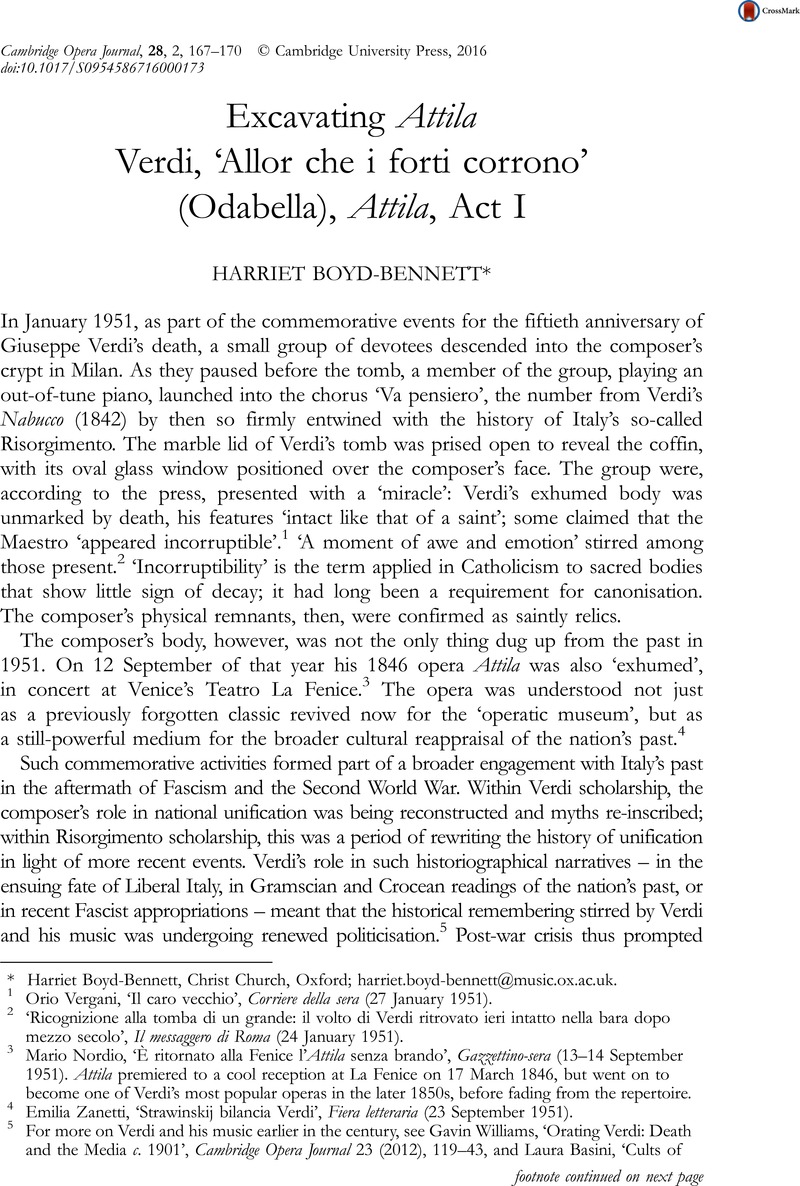Article contents
Excavating Attila Verdi, ‘Allor che i forti corrono’ (Odabella), Attila, Act I
Published online by Cambridge University Press: 28 September 2016
Abstract

- Type
- Research Article
- Information
- Cambridge Opera Journal , Volume 28 , Special Issue 2: Special Issue: Remaking the Aria , July 2016 , pp. 167 - 170
- Copyright
- © Cambridge University Press 2016
Footnotes
Harriet Boyd-Bennett, Christ Church, Oxford; [email protected].
References
1 Vergani, Orio, ‘Il caro vecchio’, Corriere della sera (27 January 1951)Google Scholar.
2 ‘Ricognizione alla tomba di un grande: il volto di Verdi ritrovato ieri intatto nella bara dopo mezzo secolo’, Il messaggero di Roma (24 January 1951).
3 Nordio, Mario, ‘È ritornato alla Fenice l’Attila senza brando’, Gazzettino-sera (13–14 September 1951)Google Scholar. Attila premiered to a cool reception at La Fenice on 17 March 1846, but went on to become one of Verdi’s most popular operas in the later 1850s, before fading from the repertoire.
4 Zanetti, Emilia, ‘Strawinskij bilancia Verdi’, Fiera letteraria (23 September 1951)Google Scholar.
5 For more on Verdi and his music earlier in the century, see Williams, Gavin, ‘Orating Verdi: Death and the Media c. 1901’, Cambridge Opera Journal 23 (2012), 119–143 CrossRefGoogle Scholar, and Basini, Laura, ‘Cults of Sacred Memory: Parma and the Verdi Centennial Celebrations of 1913’, Cambridge Opera Journal 13 (2001), 141–161 CrossRefGoogle Scholar.
6 Noiray, Michel and Parker’s, Roger examination of the autograph score suggests that Verdi made revisions to emphasise the contrast of the two sections: ‘La composition d’Attila: étude de quelques variantes’, Revue de musicologie 62 (1976), 104–123 CrossRefGoogle Scholar.
7 ‘Il ’48 si avvicinava. Le speranze degli italiani si erano ridestate in un’atmosfera incandescente; impeti di ribellione serpeggiavano per tutta la Penisola. E quando in teatro si udirono risonare frasi come … l’ammonimento di Odabella (‘Ma noi, noi donne italiche’) … frenetiche e incontenibili grida di passione eruppero da tutti i petti, in un delirio di commozione irrefrenabile; e forse nessuno allora si soffermò a considerare se le parole avevano un adeguato rilievo nell’espressione musicale’; Lu-ci, , ‘Sulle onde della radio: La forza del destino e Attila’, Il popolo nuovo (18 September 1951)Google Scholar.
8 Bemporad, Gabriella, ‘Verdi è sempre Verdi, anche in Attila opera minore’, La voce repubblicana (19 September 1951)Google Scholar.
9 Cacciola, Giuseppe, ‘La “politicità” di Giuseppe Verdi’, Rivista Musicale Italiana 52 (1950), 183–185 Google Scholar.
10 This is particularly the case with the so-called ‘new history of the Risorgimento’; see, for example, Banti, Alberto M., La nazione del Risorgimento: parentela, santità e onore alle origini dell’Italia unita (Turin, 2000)Google Scholar.
- 1
- Cited by


